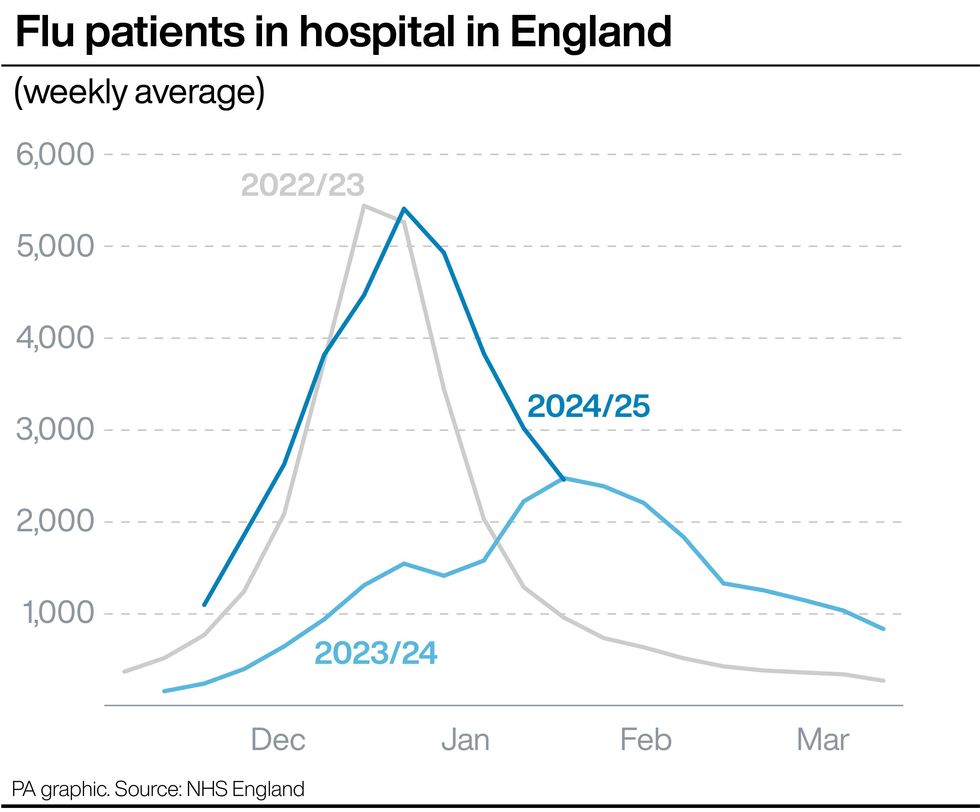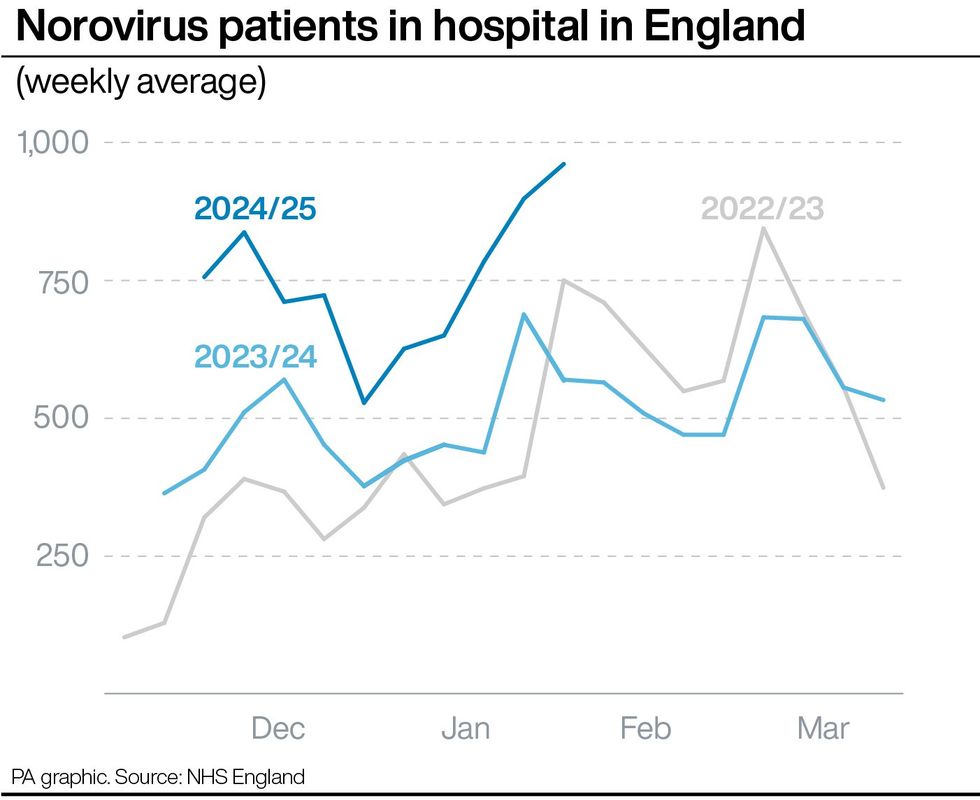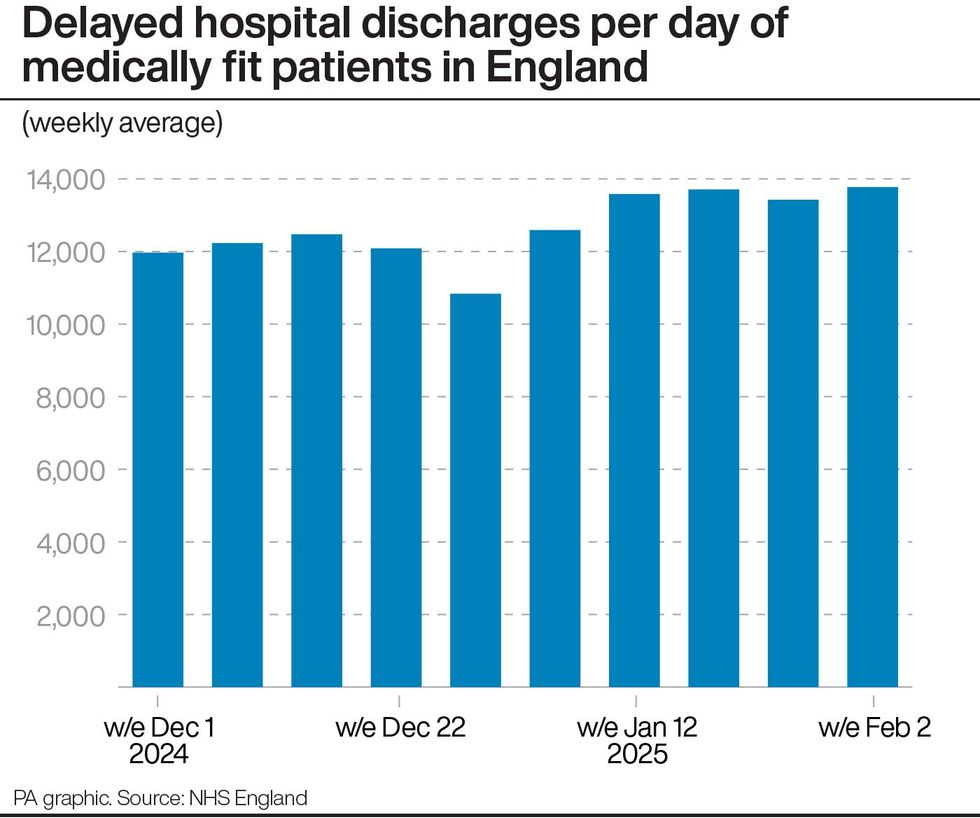Oliver Trapnell
Guest Reporter
Hospitals across England are grappling with a severe norovirus outbreak, with 961 patients hospitalised daily last week - marking a dramatic 69 per cent increase from the same period last year.
The surge represents a seven per cent rise from the previous week alone, putting significant strain on healthcare services.
The NHS has described it as the "busiest week for hospitals this winter" due to the spike in cases.
The winter vomiting bug has led to unprecedented pressure on hospital capacity, with more patients being treated than at any other point this winter season.
Three wards at St George's Hospital in Tooting, London, have been forced to close due to the outbreak of the vomiting bug.
The closures aim to minimise further spread of the virus and protect new patients from exposure.



Professor Arlene Wellman, group chief nurse for St George's Hospital, issued a stark warning about the situation.
"Once norovirus enters a hospital, it can rip through our wards like wildfire, making patients even sicker," she said.
"We are doing everything we can to limit the spread, but you can help us," Professor Wellman added.
The main symptoms of norovirus can appear suddenly and include nausea, vomiting, and diarrhoea.
LATEST DEVELOPMENTS:


Patients may also experience a high temperature, headache, stomach pain, and body aches.
The NHS advises that symptoms typically improve within two to three days, with staying hydrated being crucial during this period.
Anyone experiencing symptoms should stay away from schools, nurseries, or work until they have been symptom-free for 48 hours.
The same restriction applies to visiting hospitals and care homes.
Medical advice should be sought by calling 111 if diarrhoea persists for more than seven days or vomiting continues beyond two days.
The NHS has issued specific guidance on preventing norovirus transmission, emphasising that proper hand washing is more effective than sanitiser.


"Hand sanitisers such as alcohol gel do not kill the bug - the simple act of good hand washing with soap and water can make all the difference," Professor Wellman explained.
The virus spreads through faeces and can be easily transmitted when hands aren't thoroughly washed after using the bathroom.
Contaminated clothes and bedding should be washed separately at 60C.
Regular cleaning of high-touch surfaces is essential, particularly toilet seats, flush handles, taps and bathroom door handles.
These measures are crucial as the virus is highly contagious and can spread rapidly through close contact.
Find Out More...
The surge represents a seven per cent rise from the previous week alone, putting significant strain on healthcare services.
The NHS has described it as the "busiest week for hospitals this winter" due to the spike in cases.
The winter vomiting bug has led to unprecedented pressure on hospital capacity, with more patients being treated than at any other point this winter season.
Three wards at St George's Hospital in Tooting, London, have been forced to close due to the outbreak of the vomiting bug.
The closures aim to minimise further spread of the virus and protect new patients from exposure.



Professor Arlene Wellman, group chief nurse for St George's Hospital, issued a stark warning about the situation.
"Once norovirus enters a hospital, it can rip through our wards like wildfire, making patients even sicker," she said.
"We are doing everything we can to limit the spread, but you can help us," Professor Wellman added.
The main symptoms of norovirus can appear suddenly and include nausea, vomiting, and diarrhoea.
LATEST DEVELOPMENTS:
- Cancer breakthrough as scientists discover ‘switch’ that can revert disease infected cells
- 'I'm 98 - a daily habit that boosts health and longevity has helped me reach old age'
- Waking up at 3am? Doctor names two health issues likely to be the cause


Patients may also experience a high temperature, headache, stomach pain, and body aches.
The NHS advises that symptoms typically improve within two to three days, with staying hydrated being crucial during this period.
Anyone experiencing symptoms should stay away from schools, nurseries, or work until they have been symptom-free for 48 hours.
The same restriction applies to visiting hospitals and care homes.
Medical advice should be sought by calling 111 if diarrhoea persists for more than seven days or vomiting continues beyond two days.
The NHS has issued specific guidance on preventing norovirus transmission, emphasising that proper hand washing is more effective than sanitiser.


"Hand sanitisers such as alcohol gel do not kill the bug - the simple act of good hand washing with soap and water can make all the difference," Professor Wellman explained.
The virus spreads through faeces and can be easily transmitted when hands aren't thoroughly washed after using the bathroom.
Contaminated clothes and bedding should be washed separately at 60C.
Regular cleaning of high-touch surfaces is essential, particularly toilet seats, flush handles, taps and bathroom door handles.
These measures are crucial as the virus is highly contagious and can spread rapidly through close contact.
Find Out More...
